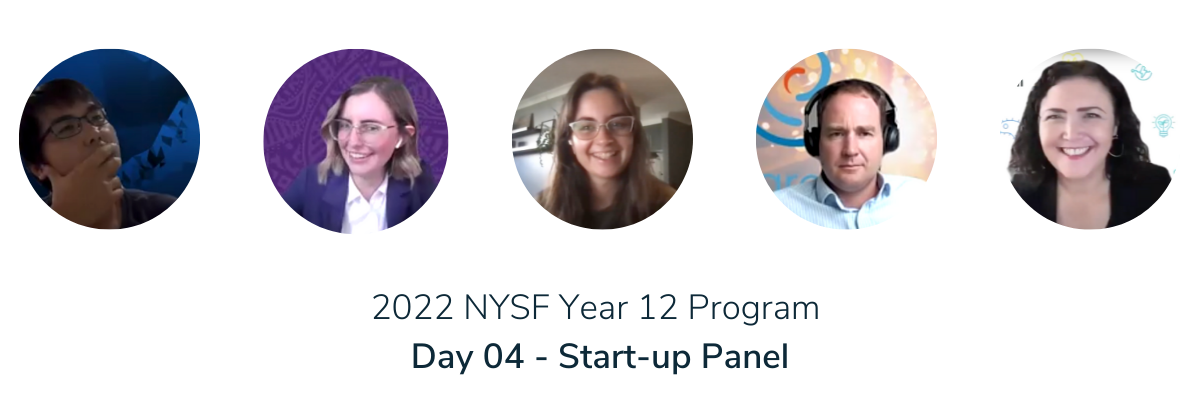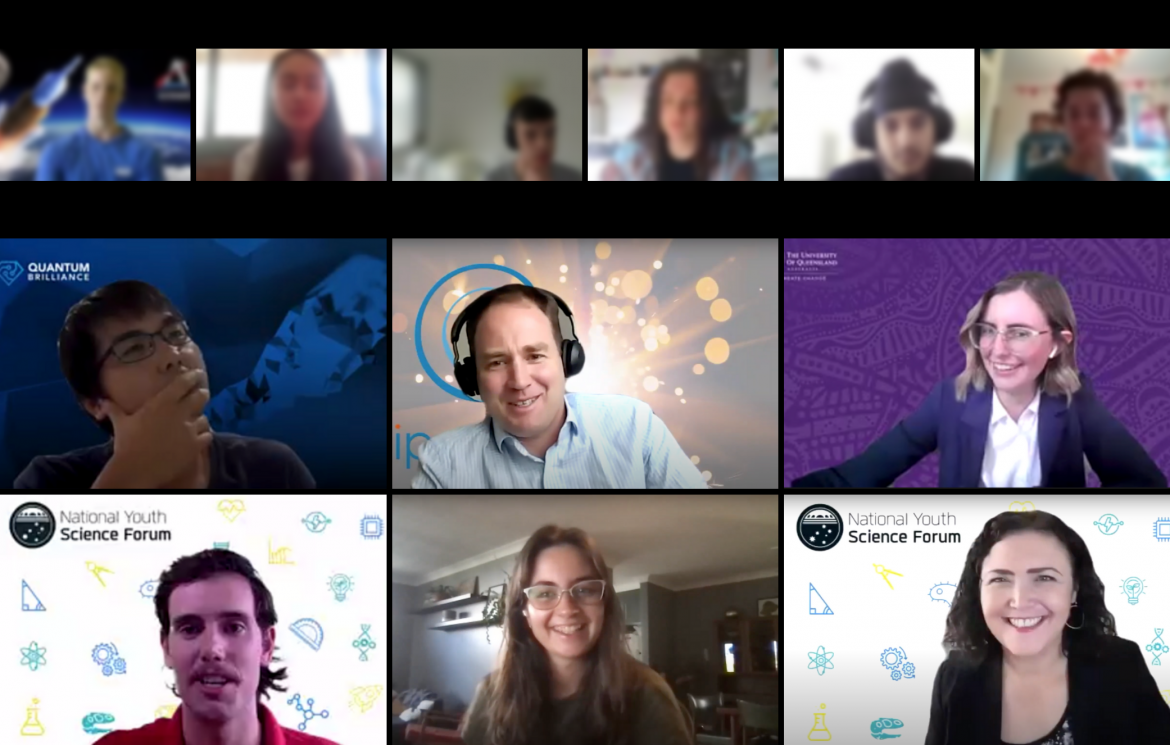
Introducing the Start-up Panel! The 2022 NYSF Year 12 Program participants are eager to put their footprint on the world, so the questions came thick and fast.
How do I start a start-up? What skills do I need? How do I develop them? The panel let us in on some insider wisdom on what gaps in the market our future STEM experts could fill with their brilliant ideas and inventions!
NYSF participants were joined by Michael Molinari, Managing Director of IP Group, Katie Gray, Special Projects Lead for Cub Care, Mark Luo, co-founder and Chief Operating Officer of Quantum Brilliance, Megan Forrest, Ventures Manager at UQ Ventures, and Dr Melanie Bagg (GAICD), CEO of NYSF to chair the discussion.

What is a start-up? Michael Molinari says it’s not just doing something new, but to come up with "different ways to make the world a better place - to put a dent in the universe." Katie Gray added that what gets her excited about start-ups is "the element of growth and the element of being open to change and evolving really rapidly."
NYSFers were relieved to hear they don't have to change the world on their own. Mark Luo states you "could work in a big organisation and still have start-up mentality to create new innovations and take your idea to next level."
Flowing on from the idea of collaboration in STEM startups, Megan Forrest stressed the importance of having a great network and support group around you and to “[build] the right connections in STEM and [with] other STEM startups” - whether that’s within your company or outside it.
NYSFer Quinn observed that some areas of the market are saturated and have many established competitors and asked what types of start-ups and areas are the most room to grow.
It's a hard question to answer, as the information will be out-of-date within 3 months! Michael Molinari says that some of the areas that are exciting at the moment are in decarbonisation and energy transition, and specifies that STEM backgrounds are useful for innovations in batteries, electrolyzer, grid and energy management, synthetic biology, and quantum computing. Michael notes that the "really interesting stuff that we see more often than not is at the intersection between different areas - so it's where you've got people coming together in biology, coming together with physicists and creating something incredible out of the combination of each of the disciplines."
Katie Gray added another way for how to find an area of growth, and that is to "look at the problems that you're experiencing in your life everyday". Her team is passionate about health because "a lot of us have had really challenging experiences in the area, and it's a problem that exists for lots of people."
A reminder from Mark Luo who reminded participants to "think where you are at your age cycle right now."
"Think about emerging technologies at that five to ten-year development life cycle and you're probably on the right track."
So, you’ve started! What’s next? How do you build a good reputation and earn the trust of your customers? Katie Gray believes the answer is in your networks and how you portray yourself to your consumers.
“Always try to maintain a relationship with the people you’re servicing… and communicate why the idea you have is valuable now, and [why it] will be for investors in the future.”
NYSFer Mac wonders if you need to go to Silicon Valley to make it big?
The general thought of the panel is not anymore! Katie Gray says that "you have companies that are based in Silicon Valley who are hiring all over the world, and you have companies in Brisbane who are hiring from Silicon Valley. It's only getting stronger and we're doing it better and better."
Why do some seemingly useless products bring success to a start-up? NYSFer Mannix is curious to what extent marketing influences the market value of an idea. Can objectively worse ideas be considered better than solid ideas solely due to better advertising?
Megan Forrest sees a lot of pitches in her work and does see marketing as important. However, she cautions that "if your product or service or solution does not fit what customers need, it will fall over even if at the beginning there might be a really big uptate...there have been downfalls where start-ups haven't delivered on their promises. I feel there's an equilibrium that occurs because if you don't have that product-market fit for your users and customers, you can do all the best marketing in the world, and you might bet a bit of traction at the beginning, but I don't think in the long term you'll have a very sustainable start-up."
The startup market is a competitive industry, and our panel had some final words of wisdom for our future entrepreneurs.
- Michael Molinari - Speak to people, get out there and test your ideas. Cultivate some mentors! Don't underestimate how much power you have.
- Katie Gray - Confidence will build with time, but it's also something you can work on as you go. The more confident you become, the easier it is to back yourself and to trust the decisions that you're making. Have fun with it too!
- Megan Forrest - Remain curious, keep learning. Complement your studies - participate in a start-up weekend. Flex your empathy muscles - really practice seeing things from diverse perspectives.
Mark Luo concluded the panel by stating how excited Quantum Brilliance is to partner with the NYSF, as the organisation wants to encourage more female scientific entrepreneurs into the field. For new products, technologies, and entirely new fields to better support and represent society, we need a better reflection of a society where those decisions are being made. That can’t be done without women playing a key role in those discussions and discoveries. This point was echoed by the entire panel, and something the NYSF has been extremely passionate about since its inception over 38 years ago.
The future is bright and full of opportunities for young entrepreneurs in Australia. Young people with enthusiasm, drive, and a deep interest in STEM have the potential to change the world.
Grow those ideas, make those connections, and change the world!
The 2022 NYSF Year 12 Program Start-up Panel was proudly supported by the Defence Science and Technology Group (DSTG).
